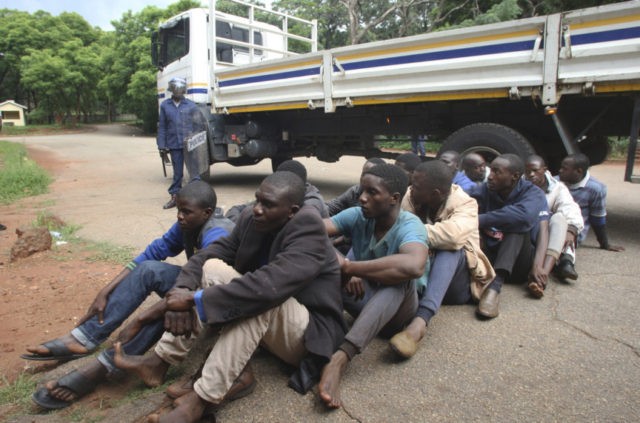Reports suggest that at least eight people have died in protests against skyrocketing gasoline prices in Zimbabwe as of this Wednesday, which continued into the day despite President Emmerson Mnangagwa reportedly claiming the demonstrations were “fizzling out.”
Riots throughout Harare triggered violent disputes and threatened businesses as opposition leaders called for only peaceful demonstrations against the ruling Zanu-PF party, which Mnangagwa has run since the forced removal of dictator Robert Mugabe in 2017. The government responded, according to opposition leaders, by beating and arresting opposition leaders and protesters. Some witnesses claim that police went door-to-door in opposition-held neighborhoods looking to beat and threaten men believed to be sympathetic to the protests. The government also temporarily shut down access to the internet in the country, arguing that opposition groups were succeeding too much at using social media to galvanize protesters.
Mnangagwa announced on Sunday that the government would raise the price of gasoline, making it the world’s most expensive at $3.33 per liter ($12.60 per gallon). Diesel fuel rose to the price of $3.11 per liter ($11.77 per gallon). The president claimed that the move was necessary because too much fuel was being sold on the black market, limiting government tax revenue on the product and demanding a price hike.
Opposition Movement for a Democratic Change (MDC) party officials called for peaceful demonstrations against the move. While some Zimbabweans did organize in a peaceful fashion, some protesters began blockading roads and attempting to shut down regular life in Harare on Monday.
Police responded by firing into crowds, the Associated Press (AP) reported Tuesday. Citing Amnesty International, the AP reported the death toll as of Monday to be eight people; other reports estimated that as many as 26 people were shot and beaten, but did not offer death counts.
“Police and soldiers went door to door and barged into homes in Mabvuku and other Harare suburbs and assaulted people, according to Zimbabwe Lawyers for Human Rights and witnesses,” the AP reported. With police distracted in attempting to hunt down dissidents, criminals took the opportunity to loot supermarkets and shops, triggering concerns that Harare may run out of food if protests continue.
The government also cut access to the internet, and particularly to social media outlets like Twitter and Whatsapp, to prevent opposition leaders from organizing times and places for protests. The government blamed the MDC for the violence, though the deadliest attacks are believed to have been conducted by police.
The MDC also suffered what it deemed a terrorist attack to its headquarters, the Morgan Tsvangirai House, named after the late opposition leader. Party officials claimed Mnangagwa’s party, Zanu-PF, placed a bomb at the headquarters to intimidate the party into silence.
Mnangagwa departed for Russia on Monday and has not been in the country since protests began. On Wednesday, the Russian state propaganda outlet Sputnik quoted Mnangagwa as saying that he was not extremely concerned about the protests because “these come and pass.”
“I understand this that there were some protests happening yesterday, but they are almost fizzling out and there is no country which has no challenging problems,” he reportedly said from Moscow.
The government did return internet access to most of Zimbabwe on Wednesday, followed by a message posted on Facebook by Mnangagwa.
“Unfortunately, what we have witnessed is violence and vandalism instead of peaceful, legal protests. There can be no justification for violence, against people and property. Violence will not reform our economy. Violence will not rebuild our nation,” the statement read, according to the New Zimbabwe newspaper. “I understand the pain and frustration that many of you are feeling.”
The MDC nonetheless condemned Mnangagwa’s government on Wednesday for violence against dissidents, alluding to the role the president is believed to have played in the 1980s genocide known as “Operation Gukurahundi,” led by Robert Mugabe.
“Responding to the shocking incompetent manner in which Mnangagwa has run government, the people of Zimbabwe peacefully came out in numbers to protest and demand a government that can actually think and govern,” a statement from MDC spokesperson Nkululeko Sibanda read. “This only goes to prove that those who masterminded Gukurahundi and all the history of violence … are at the helm of the State. The current abuse of human rights must come to an end immediately.”

COMMENTS
Please let us know if you're having issues with commenting.